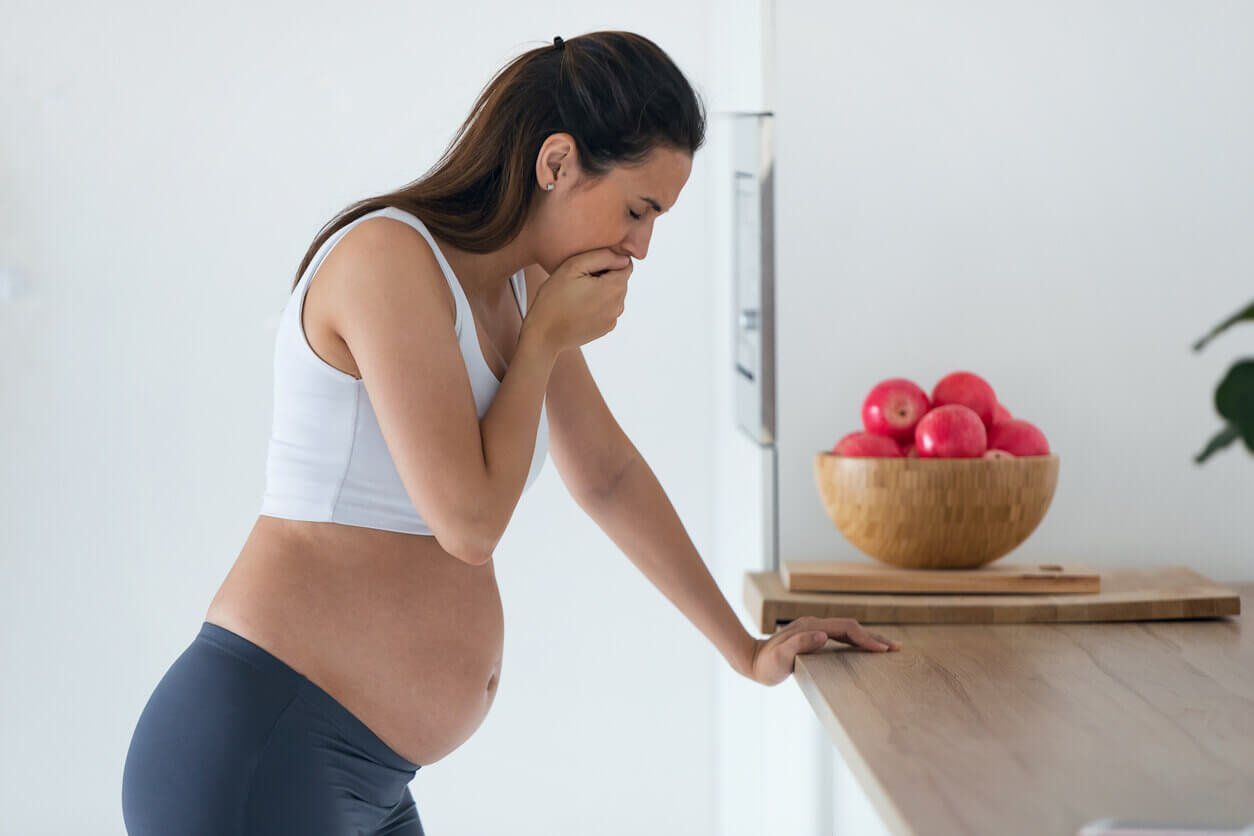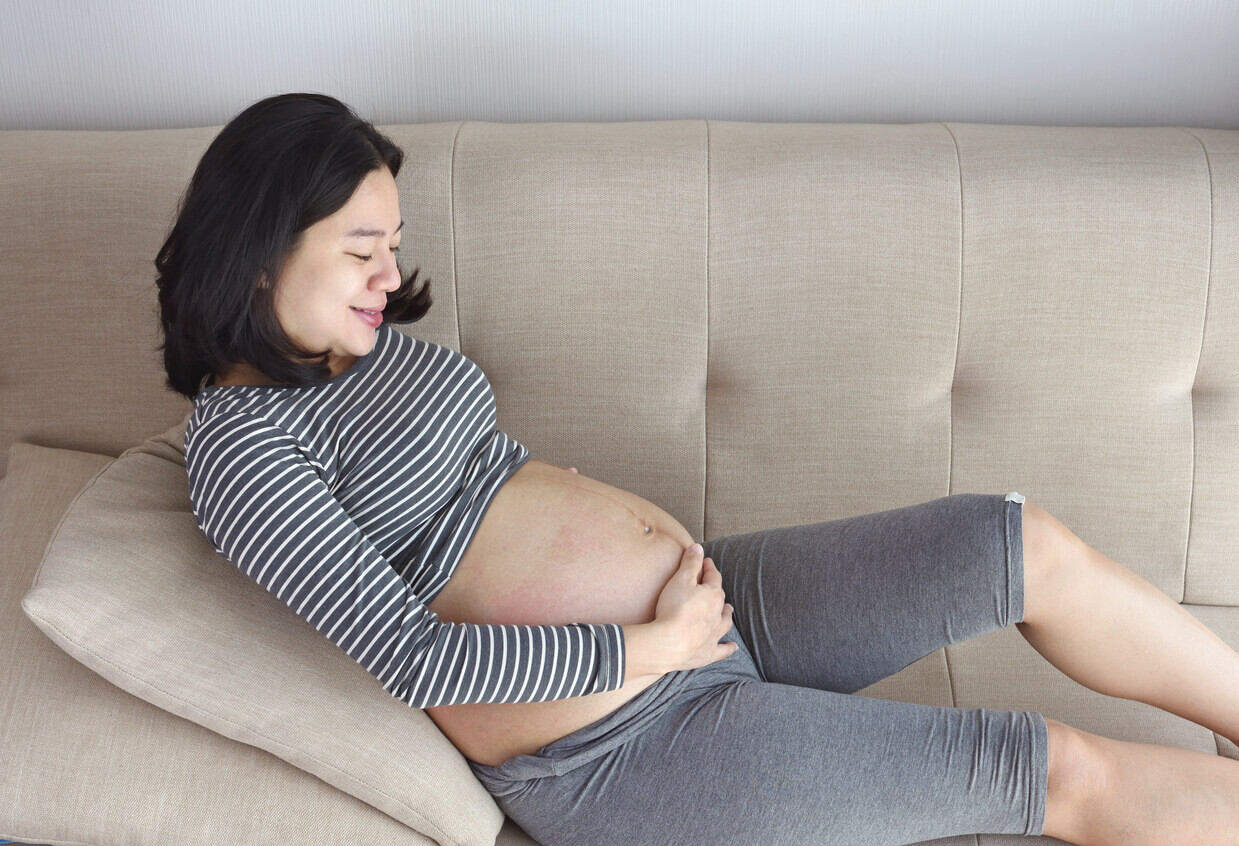All Food Makes Me Feel Sick During Pregnancy: What Can I Do?

Food may taste bad and make you feel sick during pregnancy. In this case, a series of dietary measures will have to be taken to improve the sensation and to facilitate the digestive process, thus achieving a state of well-being. Otherwise, there’s a risk of falling into an insufficient diet at a nutritional level that conditions the correct development of the fetus.
First of all, it’s important to note that, while gestation lasts, the body undergoes a series of constant changes. It’s common to experience nausea during the first few months, which will subsequently decrease. You don’t have to worry too much about it, just implement some strategies to cope with the situation in the best possible way.
How to avoid nausea in pregnancy

During the first trimester, food may taste bad and cause nausea or even vomiting. According to a study published in The Journal of Maternal-Fetal & Neonatal Medicine, ginger consumption is more effective in preventing and reducing nausea during pregnancy when compared to placebo. It’s less efficient than drugs, but it can help on many occasions.
At the same time, during this period, it’s advisable to limit the size of each meal in order to facilitate digestion. It’s also important to eliminate spicy and irritating foods from your diet and try not to eat if you don’t have an appetite. Don’t force yourself, if you have a feeling a great feeling of fullness, it’s better to stop eating and resume eating later. Consuming calories through fluids can help ease the entry of calories into the body.
How to reduce digestive discomfort from the second trimester?
When you enter the last two trimesters of pregnancy, the risk of experiencing intestinal symptoms such as pain, heartburn, fullness, or heaviness increases. This is because the fetus is growing and taking up space that previously belonged to other organs. Said compression can give rise to certain discomforts and foods may make you still make you feel sick during pregnancy. To avoid or reduce discomfort, it’s important to adapt your diet.
One of the key points to preventing food from making your feel sick during pregnancy has to do with limiting fat weight gain. It’s clear that you’re going to gain weight, but what should be avoided is a change in body composition, with an excessive increase in adipose tissue. Therefore, you’ll need to propose a dietary pattern with a predominance of fresh foods.
It’s a good strategy to divide your intakes throughout the day so that they’re less voluminous. You’ll also have to focus on chewing because, at this point, digestion begins. It’s key to correctly process foods in the mouth in order to reduce the work that the stomach and intestines have to carry out.
Similarly, certain products have to be eliminated from the diet. An example of them would be carbonated drinks. They manage to increase flatulence and abdominal pain. They also tend to concentrate sugar in amounts that are too high. This element has been shown to negatively impact metabolic health, generating a higher incidence of gestational diabetes.
Also, it’s advisable to avoid going to bed right after eating. In the case of lying down, it will always be best to do so with a slight incline. You can use cushions to help lift your upper body. This favors the digestive process and avoids symptoms such as reflux or heartburn. However, if these persist, you may need to consult a doctor to start pharmacological treatment.

Put simple remedies into practice if food makes you feel sick during pregnancy
As we’ve mentioned, it’s not uncommon to experience digestive disorders during pregnancy. Food can make you uncomfortable during pregnancy, conditioning your well-being. Therefore, the aforementioned strategies must be put into practice with the aim of reducing nausea and other discomforts or symptoms that may impact the quality of your diet.
Remember that the practice of moderate physical activity that’s adapted to the circumstances will also improve digestive capacity. A more efficient transit will occur, which will prevent constipation and associated problems. Likewise, it’s important to reach a dietary fiber intake of at least 25 grams per day. This will ensure the health of the microbiota and digestive efficiency.
Food may taste bad and make you feel sick during pregnancy. In this case, a series of dietary measures will have to be taken to improve the sensation and to facilitate the digestive process, thus achieving a state of well-being. Otherwise, there’s a risk of falling into an insufficient diet at a nutritional level that conditions the correct development of the fetus.
First of all, it’s important to note that, while gestation lasts, the body undergoes a series of constant changes. It’s common to experience nausea during the first few months, which will subsequently decrease. You don’t have to worry too much about it, just implement some strategies to cope with the situation in the best possible way.
How to avoid nausea in pregnancy

During the first trimester, food may taste bad and cause nausea or even vomiting. According to a study published in The Journal of Maternal-Fetal & Neonatal Medicine, ginger consumption is more effective in preventing and reducing nausea during pregnancy when compared to placebo. It’s less efficient than drugs, but it can help on many occasions.
At the same time, during this period, it’s advisable to limit the size of each meal in order to facilitate digestion. It’s also important to eliminate spicy and irritating foods from your diet and try not to eat if you don’t have an appetite. Don’t force yourself, if you have a feeling a great feeling of fullness, it’s better to stop eating and resume eating later. Consuming calories through fluids can help ease the entry of calories into the body.
How to reduce digestive discomfort from the second trimester?
When you enter the last two trimesters of pregnancy, the risk of experiencing intestinal symptoms such as pain, heartburn, fullness, or heaviness increases. This is because the fetus is growing and taking up space that previously belonged to other organs. Said compression can give rise to certain discomforts and foods may make you still make you feel sick during pregnancy. To avoid or reduce discomfort, it’s important to adapt your diet.
One of the key points to preventing food from making your feel sick during pregnancy has to do with limiting fat weight gain. It’s clear that you’re going to gain weight, but what should be avoided is a change in body composition, with an excessive increase in adipose tissue. Therefore, you’ll need to propose a dietary pattern with a predominance of fresh foods.
It’s a good strategy to divide your intakes throughout the day so that they’re less voluminous. You’ll also have to focus on chewing because, at this point, digestion begins. It’s key to correctly process foods in the mouth in order to reduce the work that the stomach and intestines have to carry out.
Similarly, certain products have to be eliminated from the diet. An example of them would be carbonated drinks. They manage to increase flatulence and abdominal pain. They also tend to concentrate sugar in amounts that are too high. This element has been shown to negatively impact metabolic health, generating a higher incidence of gestational diabetes.
Also, it’s advisable to avoid going to bed right after eating. In the case of lying down, it will always be best to do so with a slight incline. You can use cushions to help lift your upper body. This favors the digestive process and avoids symptoms such as reflux or heartburn. However, if these persist, you may need to consult a doctor to start pharmacological treatment.

Put simple remedies into practice if food makes you feel sick during pregnancy
As we’ve mentioned, it’s not uncommon to experience digestive disorders during pregnancy. Food can make you uncomfortable during pregnancy, conditioning your well-being. Therefore, the aforementioned strategies must be put into practice with the aim of reducing nausea and other discomforts or symptoms that may impact the quality of your diet.
Remember that the practice of moderate physical activity that’s adapted to the circumstances will also improve digestive capacity. A more efficient transit will occur, which will prevent constipation and associated problems. Likewise, it’s important to reach a dietary fiber intake of at least 25 grams per day. This will ensure the health of the microbiota and digestive efficiency.
All cited sources were thoroughly reviewed by our team to ensure their quality, reliability, currency, and validity. The bibliography of this article was considered reliable and of academic or scientific accuracy.
- Sharifzadeh, F., Kashanian, M., Koohpayehzadeh, J., Rezaian, F., Sheikhansari, N., & Eshraghi, N. (2018). A comparison between the effects of ginger, pyridoxine (vitamin B6) and placebo for the treatment of the first trimester nausea and vomiting of pregnancy (NVP). The journal of maternal-fetal & neonatal medicine : the official journal of the European Association of Perinatal Medicine, the Federation of Asia and Oceania Perinatal Societies, the International Society of Perinatal Obstetricians, 31(19), 2509–2514. Disponible en: https://doi.org/10.1080/14767058.2017.1344965
- Sweeting, A., Mijatovic, J., Brinkworth, G. D., Markovic, T. P., Ross, G. P., Brand-Miller, J., & Hernandez, T. L. (2021). The Carbohydrate Threshold in Pregnancy and Gestational Diabetes: How Low Can We Go?. Nutrients, 13(8), 2599. Disponible en: https://doi.org/10.3390/nu13082599
This text is provided for informational purposes only and does not replace consultation with a professional. If in doubt, consult your specialist.








